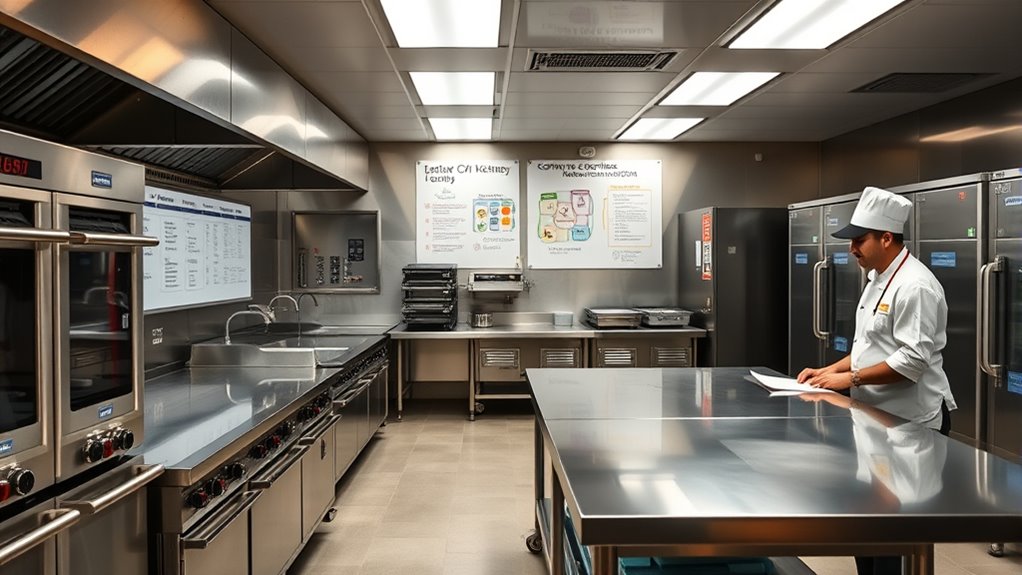Understanding commissary kitchen contracts helps you navigate lease terms, responsibilities, and guarantee compliance with health standards. You’ll want to review key clauses about sanitation, equipment maintenance, liability, and duration. Knowing your options between fixed or flexible leases, shared or exclusive space, and long- or short-term agreements helps you choose what’s best for your business growth. Being aware of pitfalls and negotiation tips will empower you to secure favorable terms that support your success—more details are waiting for you.
Key Takeaways
- Clear contract terms define responsibilities, sanitation standards, equipment maintenance, and liability coverage to prevent misunderstandings.
- Contract structures include fixed or flexible leases and shared or exclusive spaces, influencing costs and control.
- Long-term contracts offer stability, while short-term agreements provide flexibility based on business needs.
- Regularly review and negotiate contracts to ensure favorable terms, insurance coverage, and compliance with health regulations.
- Effective communication and documented responsibilities are essential for smooth operations and dispute resolution.
Key Terms and Definitions in Kitchen Agreements

Understanding key terms and definitions is essential when maneuvering kitchen agreements, as these concepts form the foundation of your contract. One crucial term is kitchen sanitation, which ensures a clean environment to meet health standards and prevent contamination. Proper sanitation procedures are often outlined to maintain safety. Equipment maintenance is another vital term; it covers how and when you should service appliances and tools to keep them in good working order. Clear definitions of these terms help avoid misunderstandings and ensure compliance with health and safety regulations. Knowing what’s expected regarding sanitation and equipment upkeep allows you to manage your kitchen effectively, reducing downtime and avoiding penalties. Regular inspection routines are important for maintaining kitchen sanitation and ensuring ongoing compliance. Additionally, understanding relationships dynamics can improve team cooperation and operational efficiency within the kitchen environment. Having a clear understanding of sound design principles can also help in creating a more efficient and safe working environment. Mastering these key terms helps you navigate your agreement confidently and keep your kitchen running smoothly. It’s also beneficial to familiarize yourself with contract clauses that specify responsibilities and liabilities, ensuring all parties are clear on their obligations.
Types of Contract Structures and Lease Options

When choosing a commissary kitchen, you need to contemplate different contract structures and lease options. Will a fixed lease work best, or do you prefer the flexibility of a flexible lease? Also, think about whether shared or exclusive space suits your needs, and if a long-term or short-term agreement aligns with your goals. Additionally, consider potential cost implications related to high fees and service limitations that could impact your business operations. Understanding lease duration options can help you better plan your business growth and operational stability, especially when factoring in legal information such as Terms and Conditions and user rights.
Fixed vs. Flexible Leases
Choosing between fixed and flexible lease options can substantially impact your commissary kitchen operations. Fixed leases offer predictable costs, making budgeting easier, often based on a set pricing model. Flexible leases, on the other hand, adapt to your needs, allowing you to scale up or down, which is ideal if your usage varies. Consider facility amenities, as some contracts include access to shared equipment or storage, influencing your costs. Here’s a quick comparison:
| Feature | Fixed Lease | Flexible Lease |
|---|---|---|
| Pricing Model | Fixed monthly rate | Variable, usage-based |
| Facility Amenities | Usually includes standard access | May include customizable options |
| Contract Duration | Long-term | Short-term or month-to-month |
| Budget Predictability | High | Lower, flexible to changes |
| Suitability | Steady, predictable needs | Growing or fluctuating demand |
Additionally, contract flexibility can help accommodate future changes in your business, aligning the lease structure with your growth plans. Being aware of industry trends can also inform your decision-making process, ensuring your lease aligns with your long-term goals. Moreover, understanding market conditions can aid in negotiating favorable terms that adapt to economic fluctuations. Considering financial stability can further support your ability to meet lease obligations during variable market periods.
Deciding between shared and exclusive space shapes how you structure your commissary kitchen lease. With shared space, you typically pay a flexible pricing model, often based on usage or time, which keeps costs lower and allows for collaboration. However, your branding rights may be limited, as multiple tenants share the same branding identity. Exclusive space grants you sole access to a designated area, offering more control over your branding and a consistent environment. While the pricing model might be higher, it provides stability and the freedom to customize your space. Consider your production needs and branding goals when choosing between the two. Additionally, understanding candle techniques can help you develop innovative product lines within your kitchen environment, whether for personal use or commercial sale. Recognizing the diverse roles of different tenants can also influence your decision, as some spaces may cater more to specific types of food or product manufacturing, and understanding security measures is essential to protect your proprietary recipes and processes.
Long-term vs. Short-term Contracts
Long-term contracts typically offer stability and predictable costs, making them ideal for established brands looking to secure a dedicated space for an extended period. They often feature favorable pricing models and renewal options, giving you peace of mind. With these contracts, you can lock in rates and plan your budget effectively. Additionally, understanding smart marketing strategies can help you maximize your visibility and growth within your chosen contract structure. Consider these points: 1. Long-term contracts usually offer better pricing models and renewal options, ensuring stability. 2. Short-term contracts grant flexibility but may come with higher costs or less favorable renewal terms. 3. Your choice depends on your growth stage, budget, and how quickly you need to adapt to market changes. Incorporating iterative processes into your approach can further optimize your contract decisions by allowing ongoing adjustments based on market feedback. Recognizing the importance of flexible lease options can help you respond effectively to evolving business needs and opportunities. Additionally, being aware of insurance coverage requirements can protect your investment and ensure compliance with lease terms. Considering market trends in the commissary industry can also inform your decision-making process to align with current demand and competition.
Essential Clauses to Review Before Signing

Before signing a contract, you need to carefully review the lease terms and duration to understand your commitments. Make certain you also check the liability and insurance coverage to protect yourself from unforeseen issues. These clauses are vital to guarantee your business operates smoothly and securely in the commissary kitchen. Additionally, understanding safety regulations can help ensure compliance and prevent potential violations that could disrupt your operations. Being aware of website privacy policies and cookie practices can also help you manage your online presence and data security effectively. Considering delivery logistics and timing requirements is essential, especially given the challenges associated with early morning hours and perishable items. Moreover, familiarizing yourself with personal growth principles can aid in developing resilience and adaptability in managing your business challenges.
Lease Terms and Duration
When reviewing lease agreements for commissary kitchens, you need to pay close attention to the specific terms and duration outlined in the contract. Understanding these details helps you plan your business and avoid surprises. Key aspects include:
- Lease length and renewal policies — know how long your lease lasts and if or when you can extend it.
- Payment schedules — clarify when and how payments are due to prevent missed deadlines.
- Termination clauses — understand conditions for ending the lease early or renewal options to secure your space long-term.
Being clear on these points ensures you’re aware of your commitments and can negotiate favorable terms. Always review how the lease duration aligns with your business plans and what happens if you need to extend or exit early.
Liability and Insurance Coverage
Understanding the liability and insurance requirements in your commissary kitchen lease is essential to protect your business and prevent potential disputes. You need to confirm that your insurance coverage aligns with health regulations and kitchen sanitation standards. Confirm that the lease specifies who’s responsible for damages or health code violations, as these can lead to costly legal issues. It’s important to verify that your insurance policy covers property damage, liability, and foodborne illness claims. Some contracts may require you to carry specific policies or provide proof of coverage. By reviewing these clauses carefully, you’ll safeguard your assets and ensure compliance with health and safety regulations. Proper liability and insurance coverage are crucial steps before signing your lease, giving you peace of mind as you operate within the kitchen.
Responsibilities and Expectations for Both Parties

Clear communication and defined responsibilities are crucial for a successful commissary kitchen contract. When both parties understand their roles, it leads to smoother operations and fewer misunderstandings. You should agree on key points such as:
- Pricing strategies: Clarify how costs are shared and how pricing impacts your branding considerations.
- Operational expectations: Define who handles inventory, cleaning, and maintenance.
- Branding and marketing: Ensure mutual understanding on how your branding appears within the shared space and any promotional efforts.
Common Pitfalls and How to Avoid Them

One of the most common pitfalls in commissary kitchen contracts is neglecting to establish clear communication channels. Without open dialogue, misunderstandings about pricing strategies or compliance regulations can arise, leading to disputes or non-compliance. To avoid this, set expectations early and document all agreements. Use the table below to clarify responsibilities:
| Issue | Solution |
|---|---|
| Pricing strategies | Agree on transparent, flexible pricing upfront |
| Compliance regulations | Regularly review and update to stay compliant |
| Communication | Schedule consistent check-ins |
| Dispute resolution | Define processes for addressing issues |
Tips for Negotiating Favorable Terms

Negotiating favorable terms in a commissary kitchen contract requires strategic preparation and confidence. To get the best deal, focus on your pricing strategies and how they align with the vendor relationships. Here are three tips:
Negotiating smartly and building strong vendor ties lead to better commissary kitchen contract terms.
- Research market rates to establish strong pricing strategies, giving you leverage during negotiations.
- Build good vendor relationships by communicating clearly and showing flexibility, which can lead to better terms.
- Don’t hesitate to ask for concessions or discounts, especially if you’re committed to a long-term partnership.
Frequently Asked Questions
How Are Dispute Resolutions Typically Handled in Commissary Kitchen Contracts?
When you face disputes in commissary kitchen contracts, conflict escalation is common without proper resolution steps. Typically, these contracts specify dispute mediation as the first step, encouraging parties to resolve issues amicably through a neutral mediator. If mediation fails, the contract may outline arbitration or legal action. You should review your agreement to understand the process, ensuring you know how disputes are handled and how to avoid unnecessary conflict escalation.
What Are the Typical Renewal and Termination Policies?
In commissary kitchen contracts, you’ll find clear renewal and termination policies. Typically, there’s a contract renewal clause that specifies how often the agreement can be extended, often annually. Termination clauses outline the notice period required and conditions under which you or the provider can end the contract early. Make sure to review these clauses carefully, so you know your options for renewing or terminating without unexpected penalties or delays.
Are There Any Hidden Fees or Additional Costs Not Listed in Contracts?
Think of contracts as open books, but sometimes hidden charges hide between the pages. You need to watch for cost disclosures that aren’t immediately obvious, because some commissary kitchens might sneak in hidden fees or extra costs not listed upfront. Always ask for detailed breakdowns and clarify every line item. Staying vigilant helps you avoid surprises, ensuring you’re not caught off guard by costs that aren’t clearly disclosed in the contract.
How Do Contract Terms Vary for Different Types of Food Businesses?
When you look at commissary kitchen contracts, you’ll find that terms vary based on your food business type. For example, a catering service might prioritize menu customization options, while a bakery could focus on equipment leasing details. Smaller startups might negotiate flexible terms, whereas established businesses often have more structured agreements. Always review how each contract addresses your specific needs, ensuring there are clear provisions for menu flexibility and equipment access.
What Legal Considerations Should I Be Aware of Before Signing?
Did you know that over 60% of food businesses face legal issues from poorly reviewed contracts? Before signing, you should carefully review liability clauses to understand your responsibilities and risks. Also, check confidentiality agreements to protect your recipes and proprietary info. Make sure the contract complies with local laws and includes clear terms on dispute resolution. Being thorough now helps you avoid costly legal problems later.
Conclusion
Charting commissary kitchen contracts is like steering a ship through choppy waters—you need a steady hand and a clear map. By understanding key terms, spotting potential pitfalls, and negotiating smartly, you’ll chart a course toward smooth sailing. Remember, a well-drafted contract is your lighthouse guiding you safely ashore. Keep your eyes open, ask questions, and steer confidently—your culinary voyage depends on it. Happy cooking and smart contracting!









